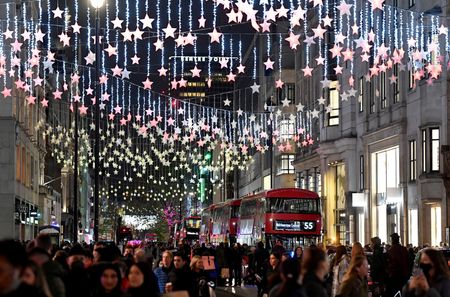By Joice Alves
LONDON (Reuters) -As the cost-of-living crisis squeezes consumers and shrinks disposable incomes, this year’s Christmas shopping period is unlikely to bring relief to European retailers selling anything from running shoes to handbags.
Amazon.com Inc on Thursday gave a clear pointer to prospective trends this holiday season, traditionally a high point for the retail sector, when it forecast a slowdown in sales growth for the period, warning that inflation-wary consumers and businesses had less money to spend.
Even Europe’s big names are warning of tough months ahead and investors have punished them accordingly.
German sportswear company Adidas has slashed its full-year guidance, while world No.2 fashion retailer H&M has launched a 2 billion Swedish crown ($177 million) cost-saving drive.
Full-year profit at British online fashion retailer ASOS sank a whopping 90% from pandemic highs and its shares are the second worst performing of the top 350 UK-listed companies this year, wiping out two thirds of its market capitalisation.
It’s a similar picture at companies such as Reckitt Benckiser, producing everyday consumer staples like Dettol cleaning products and Durex condoms, and Unilever. Both have warned of pressure on consumers.
WORST TO COME
On stock markets, the European retail sector has declined after Amazon’s grim Christmas forecast and has now lost 40% of its value so far this year, more than twice the hit on the broader regional share index.
Yet JPMorgan and other strategists say the worst is yet to come for consumers and retailers alike.
“Consumers are under a lot of pressure and are going to reduce some of the discretionary spending, while costs for retailers are going up,” said Ciaran Callaghan, head of European equity research at Amundi, Europe’s biggest asset manager.
Callaghan pointed to the rise in mortgages and other bills which are squeezing consumers, while higher prices of raw materials, such as cotton, are driving up retailers’ costs. Investors and strategists expect retailers’ margins to be squeezed well into next year as cost pressures are further exacerbated by weakening currencies and collapsing consumer demand.
SURGING COSTS
Higher energy bills, wages and elevated freight and fabric prices have pushed up costs for euro zone companies by more than 40% this year, according to Eurostat data.
Weaker currencies – the euro and the pound are down 12% and 14% against the U.S. dollar this year – have also made goods more expensive for the import-heavy retail sector.
Ahead of the holiday season, a slew of companies have announced they plan to hire temporary Christmas staff, with British retailers Boots and John Lewis each saying they would recruit 10,000 people. But wages are also rising in tight job markets where competition for staff is strong.
Some companies have managed to partially pass on higher costs to customers, even as demand falls.
IKEA, the world’s biggest home furnishing brand, is one. It reported record-high annual sales as price hikes and easing pandemic effects offset supply shortages, weakening consumer confidence and its exit from Russia.
But other companies are struggling with high levels of unsold products that they may have to shift cheaply.
“A lot of these retailers are running with elevated inventory levels, in order to clear that you’d expect a lot more promotions and discounting. That’s not going to be good for the gross margins,” Amundi’s Callaghan said.
Stephane Ekolo, strategist at Tradition in London, said the trend of high inventories was likely to persist next year. “We are going to witness more and more clear signs of demand erosion,” he said.
CHRISTMAS SHOPPING
Half of Britons plan to spend less on Christmas this year, according to market researcher Kantar, having already reined in spending last month with confidence close to a record low in the face of 10% inflation and a chaotic political backdrop.
In the euro zone, where inflation is at a similar level, retail trade in non-food products fell 3% year-on-year in August, according to Eurostat.
Amazon.com flagged that European consumers have been spending less than their American counterparts.
“It is hard to be positive on retail spend with consumer confidence still falling to record (low) levels and the cost-of-living crisis firmly hitting all,” said Trevor Green, head of UK Equities at Aviva Investors.
“Our exposure to retailers has remained highly selective all year,” Green said, adding that he prefers discount retailers, which could benefit from consumers trading down.
(Reporting by Joice Alves; Editing by Kirsten Donovan and David Holmes)

